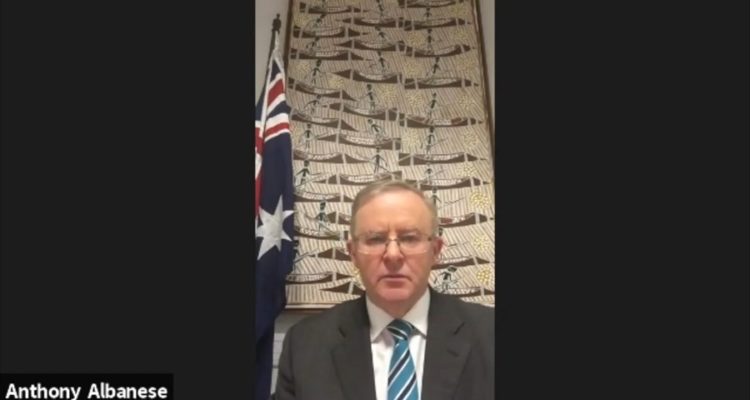Federal Opposition Leader Anthony Albanese has denounced the use of the apartheid analogy to demonise Israel.
“The use of terms like apartheid not only is not appropriate to describe the Israeli political system and structure, it also cheapens the struggle against apartheid that occurred in South Africa led by Mandela and others. It’s a dangerous thing when people look for simplistic terms that are ahistorical. They are not only offensive to the people and structures to which they are directed but they are also offensive to where the term originated.”
Albanese was addressing Australian Jewish leaders from around the country in a zoom meeting organised by the Executive Council of Australian Jewry, and chaired by ECAJ president Jillian Segal.
With ECAJ co-CEO Peter Wertheim moderating the event, Albanese also condemned the Boycott, Divestment, Sanctions (BDS) campaign, and recalled his active opposition to Marrickville Council’s 2011 resolution endorsing BDS – which he described at the time as “counterproductive self-indulgence.”
In relation to recent attempts to gain acceptance for BDS, Mr Albanese said: “I pledge my ongoing opposition to BDS” and to recognise the rise of antisemitism both from the extreme right and extreme left.
He further endorsed Shadow Foreign Minister Penny Wong’s rejection of the recent Queensland Labor conference resolution which accused Israel of “ethnic cleansing” and “apartheid”.
Anthony Albanese added that if something along the lines of the Queensland resolution or a resolution supporting BDS were to be moved at a future State or Federal conference he would be opposed to it, as would his senior colleagues.
Re-affirming his and Labor’s support for a two-State resolution of the Israel-Palestinian conflict, Anthony Albanese said “I have always been very concerned about those who argue, including some on the Left as well, that we can have a one-State solution. A single, secular, democratic State is in my view just a recipe for ongoing conflict.” Referring to the UN’s historic endorsement of the two-State principle, he said “It has to be recognised why the Jewish State of Israel arose.”
He added that he looks forward to engaging with the new Israeli government, especially over “issues we have in common” such as “scarcity of water”, and “new technology”.
He readily acknowledged that he would be critical of the actions of both Israel and the Palestinian leadership where and when he felt it appropriate. However, “where it goes into antisemitism – attacks on students, targeting Jewish schools and synagogues – there is a responsibility by political leaders to be aware of it and to speak about it.”
Repeatedly expressing concern at the rise of antisemitism Anthony Albanese, when asked whether a future Labor government would follow the UK and other countries in endorsing the IHRA working definition of antisemitism, replied “Yes, is the very clear answer. The Labor party has done that [in statements in 2016 and 2019], and that is our view. It is critical that there is leadership on those issues, leadership against any form of racism”.
He also said that, although this is under review, he was “absolutely” in favour of aligning specific elements of the Australian curriculum with broader government policies to combat specific forms of racism and other forms of prejudice in order to promote social cohesion. He expressed support for educating students not only about positive values but also to recognise and challenge specific forms of prejudice, including antisemitism.
Noting that he hopes “to lead a Labor government in the next 12 months“, he emphasised that “we wouldn’t take any action (to recognise a Palestinian State) without consulting relevant organisations and nations, including the Jewish community, Israel and the Palestinian community.”
Go to the Executive Council of Australian Jewry website to view a recording of the session with Albanese or to download a summary of the proceedings.

